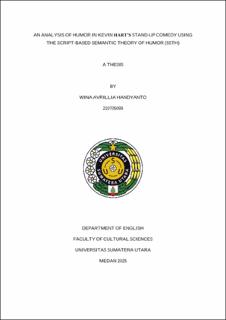An Analysis of Humor in Kevin Hart’s Stand-Up Comedy using The Script-Based Semantic Theory of Humor (SSTH)

Date
2025Author
Handyanto, Wina Avrillia
Advisor(s)
Rangkuti, Rahmadsyah
Metadata
Show full item recordAbstract
This thesis explores how humor is created in Kevin Hart‟s stand-up
comedy using the Script-Based Semantic Theory of Humor (SSTH). The main
focus is to identify and explain the types of script opposition in his jokes. Script
opposition means two ideas that are opposite or different such as normal vs.
abnormal, adult vs. child, or serious vs. silly, are used together in a single situation
to create surprise and laughter. The data for this study comes from selected parts
of Kevin Hart‟s stand-up shows that clearly show funny language. Each joke is
carefully analyzed to find the hidden meanings and conflicting ideas that make it
humorous. The study finds that Kevin Hart often mixes real-life situations with
exaggerated reactions or unexpected twists. These strong contrasts between scripts
are what make his comedy effective and funny. The results show that SSTH is a
useful theory for understanding how verbal humor works in stand-up comedy,
especially in revealing how Kevin Hart builds his jokes through language and
meaning.
Collections
- Undergraduate Theses [874]
